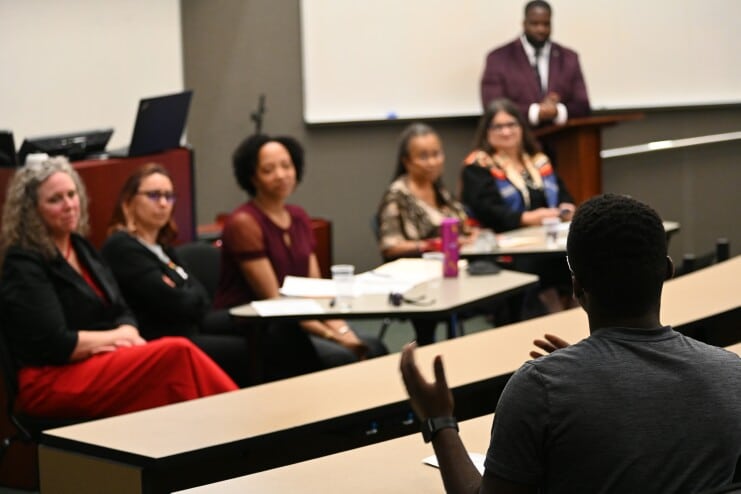
Methodist University’s B.F. Stone Lyceum has a strong history of discussing important, timely, and sometimes hot-button issues – from creationism and science to serial killers. This year was no different for the well-respected lecture series.
Methodist University’s B.F. Stone Lyceum has a strong history of discussing important, timely, and sometimes hot-button issues – from creationism and science to serial killers. This year was no different for the well-respected lecture series.
On Thursday night, dozens of faculty, staff, students, and guests gathered in the Physician Assistant Auditorium in the Medical Lecture Hall on the MU campus to attend the 25th iteration of the B.F. Stone Lyceum, “Our Diversity is Our Strength: Addressing Race and Gender in Higher Education.”
A panel of six speakers from MU led the presentation: Dr. Carla Fagan (chair and associate professor of Social Work), Dr. Kelly Walter Carney (professor of English), Dr. Kyrstin Krist (associate professor of Physical Education & Exercise Science), Dr. Mica Mitchell (assistant professor of Physical Therapy), Dr. Patricia Fecher (associate provost for Academic Operations and assistant professor of Education), and Dr. Quincy Malloy (Chief Diversity Officer).
The B.F. Stone Lyceum aimed to address current discussions on campus concerning diversity and how it can be intertwined into curriculum and pedagogy.
“Our world today goes to the beat of hatred. It’s in a constant process of tension,” said Methodist University President Stanley T. Wearden. “But this Lyceum is an antidote for me because it heals my heart. Race and gender should be prevalent in our minds, and events like this ask us to think critically.”
Each MU faculty and staff member outlined their own individual approaches to incorporating race and gender into their teaching.
Mitchell, for instance, addressed race through her lens as a pediatric physical therapist by pointing out various statistics.
“When we see certain races struggle with certain health concerns, we should be asking ourselves, ‘Why?’,” Mitchell said. “If we keep asking questions about why things are the way they are, we should also be asking how to make things better.”
The B.F. Stone Lyceum wrapped up with a Q&A session led by Malloy, allowing audience members to ask difficult and thought-provoking questions to the panel.
The lecture series started in 1998 with a generous gift from the estate of B.F. “Doc” Stone, a pharmacist from Elizabethtown, N.C. He was a respected and active member of the Methodist Church and a longtime supporter of Methodist University.
To read about the history of B.F. Stone Lyceum lectures, visit here.